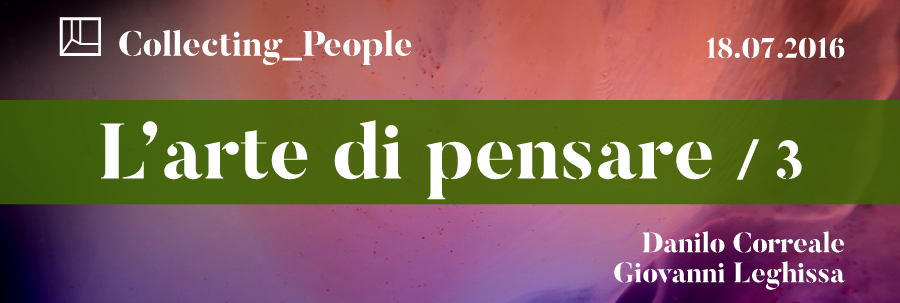COLLECTING PEOPLE

July18, 2016
at 6:30 pm
at the Diogene Tram
Danilo Correale (artist, New York, U.S.A) and Giovanni Leghissa (Assistant Professor, University of Turin in Turin, Italy).
Curated by Clara Madaro
Life time. Neoliberalism, bio-politics, acceleration, pace
Since one’s economy acquires a priority in the definition of the organization and perception of a lifetime, the same holds true in the archeology of the knowledge system. The economic paradigms implicated by neoliberalism therefore play a major role in the hierarchy of disciplines. Within this framework which seems perfectly binding, is it possible to identify a space and a time for resistance or for interrogation on the meaning of human existence?
With neoliberalism, production comes to coincide with life. The devices that we handle every day produce data that has effects on the market and puts us directly or indirectly in connection with its algorithms. Production is bio-political, because it happens continuously, and not in circumscribed time and spaces, as in the Fordist work model. The distinctions between work, play, and leisure are increasingly difficult to establish. Productivity and power also pervasively incorporated aspects of life that are considered unproductive, by changing its rhythms.
During the third meeting in 2016 of Collecting People-The Art of Thinking, the artist Danilo Correale and the philosopher Giovanni Leghissa will discuss these issues, starting with their research. How can art and philosophy see the contradictions, gaps, and paradoxes of the bio-political and economic sphere that absorbs knowledge and life? Can any mode of reorganization of time and knowledge be glimpsed in the general working of emotions, feelings, instincts, pain, human relations, desires, dreams, and everything that is connected to the body? Giovanni Leghissa and Danilo Correale move in precisely this space of meaning and desire by interweaving different worlds of knowledge and sociability.
At the end, a short excerpt of No More Sleep No More, a sensorial visual essay by Danilo Correale will be projected inside the Diogene Tram.
Danilo Correale is an artist and researcher born in 1982 Naples, Italy, and he lives and works in New York. In his work he analyzes aspects of human life, such as labor-leisure, and sleep under the lenses of time and body. His work has been presented in numerous group exhibitions, including Pigs, Artium, Spain (2016), Ennesima, Milan (2015), Kiev Biennial, Kiev (2015), Museion, Bolzano (2015) Per-formare una collezione, Madre Museum Naples (2014), Steirischer herbst, Graz, (2013) Fondazione Sandretto Re Rebaudengo, Turin (2012), Manifesta 8 in Murcia/Cartagena (2010), Moscow Biennial (2010), Istanbul Biennial (2009). Recent solo shows: Tales of Exhaustion. La Loge, Brussels BE (2016) The Missing hour. Rhythms and Algorithms, Raucci/Santamaria, Naples (2015), The Warp and the Weft, Peep-Hole, Milan (2012), Pareto Optimality, Supportico Lopez, Berlin (2011) and Entrèe, Bergen (2011), Tales of Exhaustion, Cur. By Matteo Lucchetti, La Loge, Brussels, BE (2016). Correale is the founder of the Decelerationist Reader and a regular contributor to publications in the field of critical theory. He recently published The Game – A three sided football match, FeC, Fabriano (2014) and No More Sleep No More, Archive Books, Berlin, 2015.
Giovanni Leghissa (Trieste, 1964) is an Assistant Professor in the Department of Philosophy and Educational Sciences of the University of Turin. He has taught philosophy at the Universities of Vienna, Trieste, and at the Hochschule für Gestaltung in Karlsruhe. The editor of “aut aut” (either or) since 1988, he edited the Italian edition of the works of Derrida, Blumenberg, Husserl, Overbeck, Tempels, and Hall. His publications include: The mortal god; Assumptions about modern religion (Medusa, Milan 2004); The identity game; Difference, otherness, representation (Mimesis, Milan 2005); Incorporating the old: Classical philology and invention of modernity (Mimesis, Milan 2007); and Neoliberalism. A critical introduction (Mimesis, Milan, 2012). His areas of research address the critical epistemology of human sciences, phenomenology, psychoanalysis, the relationship between religion and modernity, intercultural philosophy, and Postcolonial and Cultural Studies. For several years, his research has aimed to investigate the changes in the relationship between economic rationality and political rationality in the neoliberal age.
